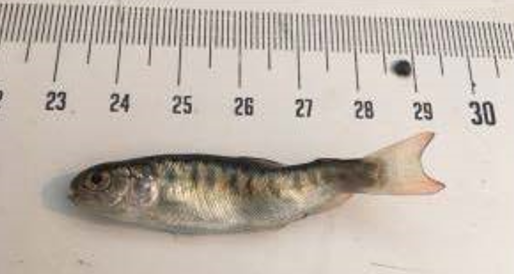The BC Wildlife Federation says there’s little that can be done to manage whirling disease beyond preventing its spread.
On December 6, the Ministry of Water, Land and Resource Stewardship announced that three trout samples from the southern arm of Kootenay Lake tested positive for the parasite that causes whirling disease in juvenile fish.
It’s unknown if the detections are linked to Yoho National Park, where whirling disease was first confirmed in the province in 2023. That discovery prompted a watercraft ban across all waterways in both Yoho and Kootenay National Parks.
Whether similar measures will be implemented on Kootenay Lake is still unclear, according to Jesse Zeman, Executive Director of the BC Wildlife Federation.
“I’m not sure what the province will intend on doing. Kootenay Lake is a really large water body. It flows into the Columbia system eventually. We already have regulations around clean, drain, dry in terms of how people move boats, especially after being in Kootenay Lake. The big thing is making sure that if the parasite has been fished or if it’s been settled, then it’s not effective. When people move it around, that’s where things become a problem.”
Anything that touches the water, including pets and water gear, should be cleaned, drained, and dried to prevent the spread. However, Zeman says that’s about all that can be done.
“The monitoring piece will just be around the fish that get it. Now that we know we have it, there’s really no way to manage it once we end up with it in a water body. So now it’s just monitoring, and our best efforts need to go into making sure that it doesn’t spread from there. That’s all we can do.”
The BCWF is disappointed that the presence of whirling disease last year in Yoho National Park didn’t merit a stronger response from the federal government.
Zeman believes a defence program for whirling disease can “do double duty” in preventing the spread of the parasite along with invasive mussels, adding that the federal government needs to step up with funding to protect BC’s waterways.
“The province has had a tough time keeping the mussel defence program funded. Fisheries and Oceans Canada (DFO) used to put in $400,000 a year, and now they don’t. The best medicine, when it relates to whirling disease or to invasive mussels, is prevention. Without dedicated funding, it makes it really hard. Having whirling disease in BC is likely a factor and outcome of not protecting our borders.”
It’s unclear how the fish in Kootenay Lake will respond to the parasite, but the BCWF is optimistic the reaction won’t be as severe as in other jurisdictions.
“The most important thing that people in the community need to know now is to make sure that they’re following the regulations and that if they’re in the water—any water around Kootenay Lake—that whatever goes in the water is completely decontaminated before they go somewhere else.”
Be the first to know! Don’t miss out on breaking news and daily updates in your area. Sign up to MyKootenayNowNews Alerts.




